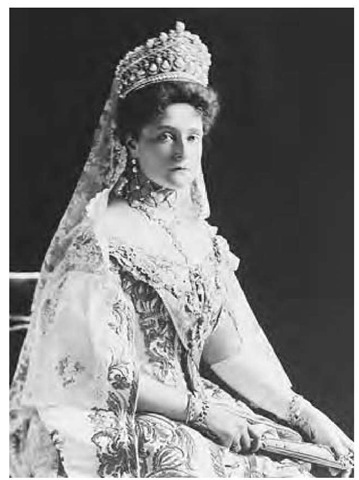(1872-1918)
Czarina of Russia at the time of World War I and the Russian Revolution. Alexandra of Hesse-Darmstarmstadt, a German noblewoman, became empress (czarina) of Russia upon her marriage to the newly installed monarch, Nicholas II, in April 1894. Unpopular both at the imperial court and among the wider public, her influence during World War I played an important role in the decline of political stability within her adopted country. Following the outbreak of revolution in March 1917, Alexandra and her husband were forced from power. They were held captive by the new provisional government and, after a second revolution in November 1917, by the Bolshevik forces led by V. I. Lenin. As White (antirevolutionary) forces neared the Siberian city where they were confined in the summer of 1918, Alexandra, her husband, their children, and the members of their immediate entourage were executed on Lenin’s order.
A strikingly beautiful woman, Alexandra suffered from a variety of physical and psychological ailments, including a weak heart. After her marriage to Nicholas, the empress quickly gave birth to four daughters; her failure to produce a son and heir to the throne frustrated her until ten years after her wedding. She was then crushed to learn that the boy, Alexis, was afflicted with hemophilia. Alexandra had long been prone to mystical religious feelings and attracted to religious charlatans. Starting in 1907, Alexandra fell under the influence of Rasputin, a dissolute, self-proclaimed holy man who seemed able to ease her son’s suffering. Alexandra’s apparent domination by Rasputin led to widespread and salacious rumors of a sexual liaison between the two.
The outbreak of World War I heightened Alexandra’s influence. Although the empress’s German origins intensified public hostility toward her, Nicholas’s departure for the fighting front in the late summer of 1915 made Alexandra the key figure in the Russian monarchy. At the urging of Rasputin, she resisted political reforms such as giving more power to the Duma, Russia’s representative assembly, and arranged the dismissal of capable government leaders such as the war minister, Andrei Polivanov. She also arranged the appointment of incompetent proteges of Rasputin, including Russia’s new prime minister, Boris Sturmer, in January 1916. Alexandra ignored warnings that appointing a top official with a German name would be a grave provocation for the Russian public in the midst of a bitter war.
As Russia’s wartime difficulties grew, Alexandra became increasingly determined to serve as a bastion of monarchial strength, even trying to influence the strategy of the Russian army. In the winter of 1916-1917, as starvation spread in the country’s cities and the army was wracked by desertion, she insisted that the basic loyalty of Russia’s peasant population would overcome such difficulties.
Russian Czarina Alexandra Fyodorovna

